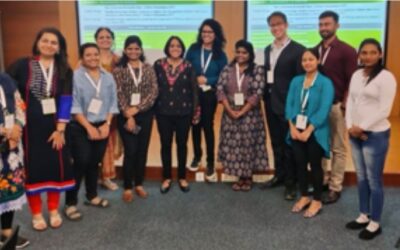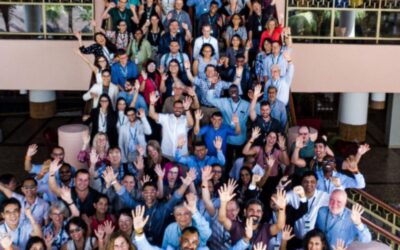SA – Where Innovation Emanates!
Stellenbosch University
Africa Health Research Institute
University of Pretoria
University of Witwatersrand
Vanderbilt University Medical Center
University of California San Francisco
Colorado State University
University of Washington
RePORT South Africa (SA) III is a collaborative research network, comprised of 14 research groups from seven South African and four US institutions, spearheading innovative research in the field of tuberculosis (TB) biomarkers. Led by eight clinical research sites and five analytical laboratories, the participating institutions in South Africa and the USA are listed below
Uni of Cape Town
Stellenbosch Uni
Africa Health Research Institute
Uni of Pretoria
Uni of Witwatersrand
VANDERBILT UNI MEDICAL CENTER
UNI OF CA SAN FRANCISCO
COLORADO STATE UNI
UNI OF WASHINGTON
A Strong Network
The network’s structure is robust, with each institution playing a significant role in contributing to a wealth of TB biomarker knowledge and expertise. The University of Cape Town houses the South African Tuberculosis Vaccine Initiative (SATVI), the UCT Lung Institute, and the Red Cross Children’s Hospital. Stellenbosch University’s Immunology Research Group and SAMRC Centre for Tuberculosis Research, and the Africa Health Research Institute and University of Pretoria also play essential roles. The University of Witwatersrand hosts the Perinatal HIV Research Unit and the Kana Laboratory. The US institutions, including Vanderbilt University Medical Center, University of California San Francisco, Colorado State University, and University of Washington, provide data management and laboratory expertise to enrich the network’s scope and impact.
Insights gained from RePORT II have fueled the network’s ongoing focus on research aims focusing on expanding and strengthening the network, discovering and validating biomarkers for TB triage and screening, delineating specific T-cell response attributes to vaccine antigens, evaluating treatment response biomarkers, and investigating microbial genotypic diversity related to TB disease outcomes. The network collaboration in the operational space ensures robust tracking of sample collection, biorepository storage, and logistics for analytical labs.
Research – Not Without its Challenges
A large, state-of-the-art biorepository also brings challenges, such as continuous funding for sample storage, highlighting the need for sustained financial support to maintain the network’s research momentum. However, RePORT South Africa III is well-positioned in the fight against TB, leveraging its multidisciplinary expertise and collaborative spirit to drive impactful research outcomes and evidence-based solutions for global TB prevention and care. The recent annual meeting in Pretoria provided a platform for sharing unpublished data and fostering collaboration across international networks, setting the stage for groundbreaking discoveries in the field. With a commitment to innovation and collaboration, RePORT South Africa III continues to lead the way in transforming TB research and shaping the future of global health.
RePORT – 3rd Cycle
The RePORT III team includes current RePORT investigators with extensive experience in clinical and translational TB science, supplemented by new clinical and laboratory investigators with internationally recognized expertise in drug-sensitive (DS) and drug-resistant (DR) TB therapeutics and microbiology. With the addition of the Mdantsane site in the Eastern Cape Province, the network will include eight clinical sites with access to adult and pediatric populations with high TB/HIV incidence; large DS- and DR-TB cohorts aligned to the Common Protocol; and state-of-the-art laboratory capacity to conduct biomarker, immunological, genetic, and microbial assays, at seven SA and four US institutions with a strong track record of successful partnership.
The scientific focus of RePORT III is informed by progress made in RePORT II. It is essential that new triage and screening biomarkers can detect both clinical TB in symptomatic patients presenting for healthcare, and undiagnosed subclinical TB in asymptomatic people, including Mycobacterium tuberculosis (Mtb-) exposed household contacts. Ongoing laboratory analyses of samples collected in RePORT II are testing a suite of novel biomarkers for this purpose in 845 symptomatic Cohort A patients (236; 28% clinical TB cases) and 982 Cohort B household contacts (53; 5.4% subclinical TB cases), using 72,607 well-characterized, stored samples. Advances on the work of RePORT II will include validation of serum exosomal, urine metabolomic, and oral swab molecular biomarkers that were discovered and tested in RePORT II; and prospective testing of promising new triage and screening biomarkers in the same populations.
1
AIM
Expand and strengthen the RePORT South Africa network.
2
AIM
Discover, test and validate biomarkers for triage and screening of symptomatic and subclinical TB disease.
3
AIM
Delineate specific T cell response attributes to high-priority vaccine antigens in clinical TB, subclinical TB, incident TB cases and controls.
4
AIM
Evaluate biomarkers of treatment response.
4a
sub AIM
Discover, test, and validate new host biomarkers of TB treatment response.
4b
sub AIM
Evaluate the prevalence, phenotype and risk factors of post-TB lung disease.
4c
sub AIM
Investigate microbial genotypic and phenotypic diversity related to subclinical/clinical TB disease phenotypes and poor treatment outcome.
Priority research areas that were not directly addressed in RePORT II include the immune response to high-priority TB vaccine antigens, prevalence and predictors of post-TB lung disease, and host transcriptomic, genetic and microbial markers of treatment outcome, including treatment of DR-TB. These knowledge gaps will be addressed in RePORT III by evaluation of specific T-cell responses to high-priority vaccine antigens in clinical TB, subclinical TB, incident TB cases and controls, to inform development of new preventive and therapeutic vaccines; addition of a standalone DR-TB cohort receiving the South African 6-month oral BPaLL regimen (bedaquiline, pretomanid, linezolid and levofloxacin); and addition of serial respiratory evaluations for DS – and DR-TB patients in Cohort A. Stored and prospectively collected blood RNA samples will be studied in tandem with genetic regulation of transcriptional responses associated with poor treatment outcomes, including death, treatment failure, recurrence, and post-TB lung disease. Stored and prospective sputum samples will be used to investigate microbial genotypic and phenotypic diversity related to these treatment outcomes. Thus, a standardized analytic approach will allow evaluation of the inter-relationships between host transcriptomic, genetic and microbial diversity and poor treatment outcomes, including post-TB lung disease, in both DS- and DR-TB cohorts.
These analyses of new and existing TB cohorts in diverse populations will inform evidence-based approaches for development of the most promising TB triage and screening biomarkers to impact global TB control. Notably, evaluation of biomarker performance for asymptomatic, subclinical TB will be interpreted and benchmarked against performance for symptomatic, clinical TB in the same populations. Our analyses of host transcriptomic and immunogenetic biomarkers will deliver novel insights into the DR-TB treatment response, benchmarked against parallel observations in DS-TB, and correlated with microbial determinants of poor treatment outcome, including the severity, phenotype and risk factors of post-TB lung disease. Harmonization of data and specimen collection through the Common Protocol will enable validation of these findings in other RePORT countries.
What's new
JHU Spotlight
Johns hopkins university SpotlightJohns Hopkins University (JHU) - A Foundational Member of RePORT International Johns Hopkins University (JHU) has been a partner in RePORT International’s efforts since the network’s inception in 2014, having served as a foundational...
Cross-Consortium Grant Results
Cross-Consortium Grant ResultsRePORT International Coordinating Center (RICC) Cross-Consortium Grant ResultsWe are pleased to announce the awardees of the RICC Cross-Consortium grant competition. A special thanks to the applicants and external reviewers of each...
International Annual Meet 2024
international annual meet 2024RePORT International Annual Meeting 2024, August 21-23, SalvadorThe RePORT International Annual Meeting 2024 was held from August 21-23 in Salvador, Brazil, bringing together approximately 120 participants from our global network. This...



